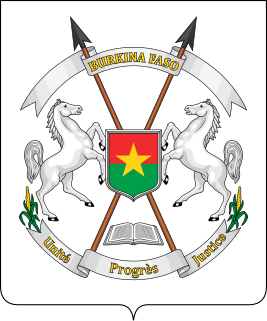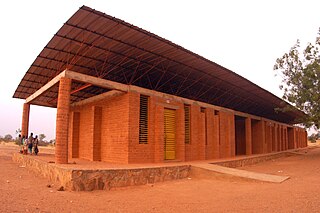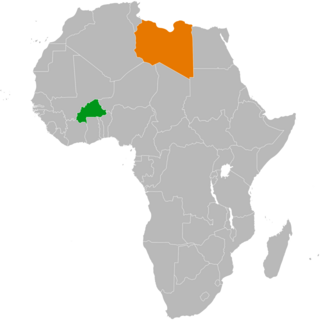| |||||
| Decades: | |||||
|---|---|---|---|---|---|
| See also: | |||||
Events from the year 2007 in Burkina Faso .
| |||||
| Decades: | |||||
|---|---|---|---|---|---|
| See also: | |||||
Events from the year 2007 in Burkina Faso .

Burkina Faso is a landlocked country in West Africa with an area of 274,200 km2 (105,900 sq mi), bordered by Mali to the northwest, Niger to the northeast, Benin to the southeast, Togo and Ghana to the south, and the Ivory Coast to the southwest. It has a population of 20,321,378. Previously called Republic of Upper Volta (1958–1984), it was renamed Burkina Faso by President Thomas Sankara. Its citizens are known as Burkinabè, and its capital and largest city is Ouagadougou.

The Burkina Faso Armed Forces is the term used for the national military of Burkina Faso. The service branches of the armed forces include its Army, Air Force, National Gendarmerie and People's Militia. Being a landlocked country, Burkina Faso has no navy.

The history of Burkina Faso includes the history of various kingdoms within the country, such as the Mossi kingdoms, as well as the later French colonisation of the territory and its independence as the Republic of Upper Volta in 1960.

Thomas Isidore Noël Sankara was a Burkinabé military officer, Marxist revolutionary, and pan-Africanist, who served as President of Burkina Faso from his coup in 1983 to his deposition and murder in 1987. Viewed by supporters as a charismatic and iconic figure of revolution, he is commonly referred to as 'Africa's Che Guevara'.

Blaise Compaoré is a Burkinabé-Ivorian former politician who served as the second president of Burkina Faso from 1987 to 2014. He was a close associate of the first president, Thomas Sankara, during the 1980s, and in October 1987, he led a coup d'état during which Sankara was killed. Subsequently, he introduced a policy of 'rectification', overturning the leftist and Third Worldist policies pursued by Sankara. He won elections in 1991, 1998, 2005 and 2010, in what were considered unfair circumstances. His attempt to amend the constitution to extend his 27-year term caused the 2014 Burkinabé uprising. On 31 October 2014, Compaoré resigned, whereupon he fled to the Ivory Coast.

Education in Burkina Faso is structured in much the same way as in the rest of the world: primary, secondary, and higher education. As of 2008, despite efforts to improve education, the country had the lowest adult literacy rate in the world (25.3%).

The 2009–2010 West African meningitis outbreak was an epidemic of bacterial meningitis which occurred in Burkina Faso, Mali, Niger, and Nigeria since January 2009, an annual risk in the African meningitis belt. A total of 13,516 people have been infected with meningitis, and 931 have died. Nigeria has been the most adversely affected, with over half of the total cases and deaths occurring in the nation. The WHO reported on 27 March 2009 that 1,100 had died and there were 25,000 suspected cases. It is the worst outbreak in the region since 1996, and a third of the world's emergency vaccine stockpile for the bacterial form has been consumed. The GAVI Alliance has been trying to secure more vaccines.

A landlocked sub-Saharan country, Burkina Faso is among the poorest countries in the world—44 percent of its population lives below the international poverty line of US$1.90 per day —and it ranks 185th out of 188 countries on UNDP's 2016 Human Development Index .Rapid population growth, gender inequality, and low levels of educational attainment contribute to food insecurity and poverty in Burkina Faso. The total population is just over 20 million with the estimated population growth rate is 3.1 percent per year and seven out of 10 Burkinabe are younger than 30. Total health care expenditures were an estimated 5% of GDP. Total expenditure on health per capita is 82 in 2014.

Burkina Faso–Libya relations refers to the current and historical relationship between Libya and Burkina Faso. Libya maintains an embassy in the Burkinabé capital of Ouagadougou, and Burkina Faso has an embassy in the Libyan capital of Tripoli.

Burkina Faso–India relations refers to the international relations that exist between Burkina Faso and India. Burkina Faso maintains an embassy in New Delhi. India maintained an embassy in Ouagadougou from November 1996 until its closure in July 2002. Currently, India maintains an honorary consulate in Ouagadougou, which functions under the jurisdiction of the High Commission of India in Accra, Ghana.

On 2 March 2018, at least eight heavily armed militants launched an assault on key locations throughout Ouagadougou, the capital city of Burkina Faso. Targets included the French embassy and the headquarters of Burkina Faso's military.
On 4 August 1983 a coup d'état was launched in the Republic of Upper Volta in an event sometimes referred to as the August revolution or Burkinabé revolution. It was carried out by radical elements of the army led by Thomas Sankara and Blaise Compaoré, against the regime of Major Jean-Baptiste Ouédraogo. Ouédraogo had been brought to power in a 1982 coup with the Conseil de Salut du Peuple (CSP), a body composed of military officials of different ideological backgrounds. The CSP chose Sankara as Prime Minister of Upper Volta in January 1983. As his tenure progressed, Ouédraogo found himself unable to reconcile the conservative and radical factions of the CSP, whose disagreements were leading to a political stalemate. On 16 May he purged his government of pro-Libyan and anti-French elements, disbanded the CSP, and had Sankara and several other important officials arrested. This move sparked discontent among Sankara's supporters. Sankara was eventually released while one officer, Compaoré, began to organise military resistance to the government.
The Sanmatenga attacks occurred on 8 September 2019 in the Sanmatenga Province, Burkina Faso. In the Barsalogho Department a vehicle transporting people and goods, that was returning from a market, drove over an improvised explosive device (IED). 15 passengers were killed and six were injured in the IED attack. Most of the victims were traders. Meanwhile, around 50 km to the east, a convoy with vans carrying provisions for people displaced by fighting was attacked by gunmen. In this attack, 14 people were killed. It is unknown who carried out this attacks.
The Burkina Faso mosque attack occurred on the evening of Friday, 11 October 2019 in a mosque in Oudalan Province, Burkina Faso which left 16 people dead and two injured. It happened while the residents were praying inside the Grand Mosque in Salmossi, a village close to the border with Mali. AFP reported that 13 people died on the spot while 3 died later due to the injuries.
The Dolmané gold mine attack occurred on 4 October 2019 near Madouji, Arbinda Department, Soum Province, Burkina Faso. The Dolmané gold mining site was attacked by suspected Islamic terrorists. The attack took place not far from where a bridge linking two northern towns was blown up in mid-September. At least 20 persons, mostly people that worked in the gold mine, were killed and an unknown number of people were injured. Both Islamic State and al-Qaeda have affiliated groups in the region. It is unknown which of the two was responsible for this attack.
Events in the year 2012 in Burkina Faso.
Events in the year 2010 in Burkina Faso.
Events in the year 2008 in Burkina Faso.
Events in the year 2006 in Burkina Faso.

Islamist insurgency in the Sahel or Jihadist Insurgencies in the Sahel refers to the Islamist insurgency in the Sahel region of West Africa following the 2011 Arab Spring to the present day. In particular, the intensive conflict in the three countries of Mali, Niger and Burkina Faso has been referred to as the Sahel War.